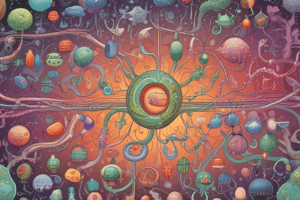Podcast
Questions and Answers
In cellular respiration, which step occurs in the mitochondria and generates the most ATP?
In cellular respiration, which step occurs in the mitochondria and generates the most ATP?
What is the primary energy currency of cells used for various cellular processes?
What is the primary energy currency of cells used for various cellular processes?
What is the process of converting a liquid to a solid, such as turning a liquid like table salt into solid form?
What is the process of converting a liquid to a solid, such as turning a liquid like table salt into solid form?
Which term refers to the study of an organism's complete genetic material?
Which term refers to the study of an organism's complete genetic material?
Signup and view all the answers
What is the name of the process where genetic information flows from DNA to RNA to proteins?
What is the name of the process where genetic information flows from DNA to RNA to proteins?
Signup and view all the answers
Which branch of science applies physics principles to biological systems?
Which branch of science applies physics principles to biological systems?
Signup and view all the answers
What is the role of catalysts in chemical reactions?
What is the role of catalysts in chemical reactions?
Signup and view all the answers
Which step in cellular respiration involves the conversion of food molecules into ATP?
Which step in cellular respiration involves the conversion of food molecules into ATP?
Signup and view all the answers
How do vaccines prevent infections?
How do vaccines prevent infections?
Signup and view all the answers
What is the central dogma of genetics?
What is the central dogma of genetics?
Signup and view all the answers
In which field are engineering principles applied to medical treatment?
In which field are engineering principles applied to medical treatment?
Signup and view all the answers
What is the study of interactions between living organisms and the Earth's atmosphere, oceans, and land?
What is the study of interactions between living organisms and the Earth's atmosphere, oceans, and land?
Signup and view all the answers
What is the importance of understanding chemical reactions?
What is the importance of understanding chemical reactions?
Signup and view all the answers
How do catalysts influence chemical reactions?
How do catalysts influence chemical reactions?
Signup and view all the answers
What is the significance of cellular respiration?
What is the significance of cellular respiration?
Signup and view all the answers
Explain the process of DNA replication.
Explain the process of DNA replication.
Signup and view all the answers
What is genetic inheritance?
What is genetic inheritance?
Signup and view all the answers
What is the goal of synthetic biology?
What is the goal of synthetic biology?
Signup and view all the answers
Study Notes
- Channel: HE JAY HIND STUDENTS
- Speaker: Sar Tarun Roopani
- Topic: Chemistry chapter to join IITs
- Importance of understanding chemical reactions
- Example: Burning a pepper in water (sodium and chlorine)
- Fizzing reaction: Electrolytes and ions forming new bonds
- Heating process: Creating new compounds (like ammonia)
- Pressure changes: Influence on reactions (e.g., Haber process)
- Ammonia formation: Nitrogen and hydrogen combination
- Increasing pressure: Affects reaction rate
- Household example: Alka-Seltzer (releases carbon dioxide)
- Catalysts: Speed up reactions without being consumed
- Elements: Rearrange atoms to form new compounds
- Crystallization: Converting a liquid to a solid (like table salt)
- Influenza virus: Causes flu, spreads through respiratory droplets
- Vaccines: Prevent infections by introducing a weakened virus
- Vaccine development: Combines antigens with adjuvants to enhance immune response
- Mammalian cells: Contain membranes, nuclei, and other organelles
- Cellular respiration: Produces ATP from food molecules
- Glycolysis: First step in cellular respiration, occurs in the cytoplasm
- Citric acid cycle: Second step, occurs in the mitochondria
- Electron transport chain: Third step, generates most ATP
- Oxygen consumption: Final step in cellular respiration, requires oxygen
- ATP: Energy currency of cells, used for various cellular processes
- Cellular metabolism: Sum of all biochemical processes in a cell
- Protein synthesis: Building proteins from amino acids
- DNA replication: Creating a copy of DNA for cell division
- DNA structure: Double helix with bases (A, C, G, T) pairing up
- Central dogma: Genetic information flows from DNA to RNA to proteins
- Mutations: Changes to DNA sequence, can cause genetic disorders
- Gene expression: Producing proteins from DNA
- Genetic variation: Differences in DNA sequences between individuals
- Genetic inheritance: Traits passed from parents to offspring
- Genomics: Study of an organism's complete genetic material
- Biotechnology: Industrial applications of biological systems and organisms
- Biomedical engineering: Applying engineering principles to medical treatment
- Neuroengineering: Developing devices and technologies for the brain and nervous system
- Nanotechnology: Engineering at the nanoscale
- Bioinformatics: Analyzing biological data using computers
- Synthetic biology: Designing and constructing new biological parts and systems
- Biochemistry: Study of chemical processes within living organisms
- Biophysics: Application of physics principles to biological systems
- Biogeochemistry: Study of interactions between living organisms and the Earth's atmosphere, oceans, and land.
Studying That Suits You
Use AI to generate personalized quizzes and flashcards to suit your learning preferences.
Description
Explore the significance of understanding chemical reactions, from burning a pepper to forming ammonia and using catalysts. Learn about cellular respiration, DNA replication, gene expression, and genetic inheritance. Delve into topics like genomics, bioinformatics, and biogeochemistry for a holistic view of biological and chemical processes.




